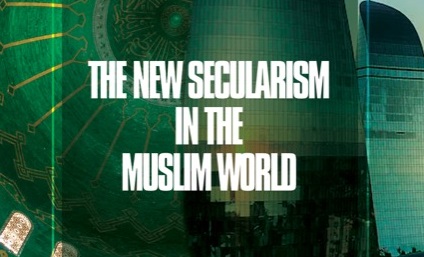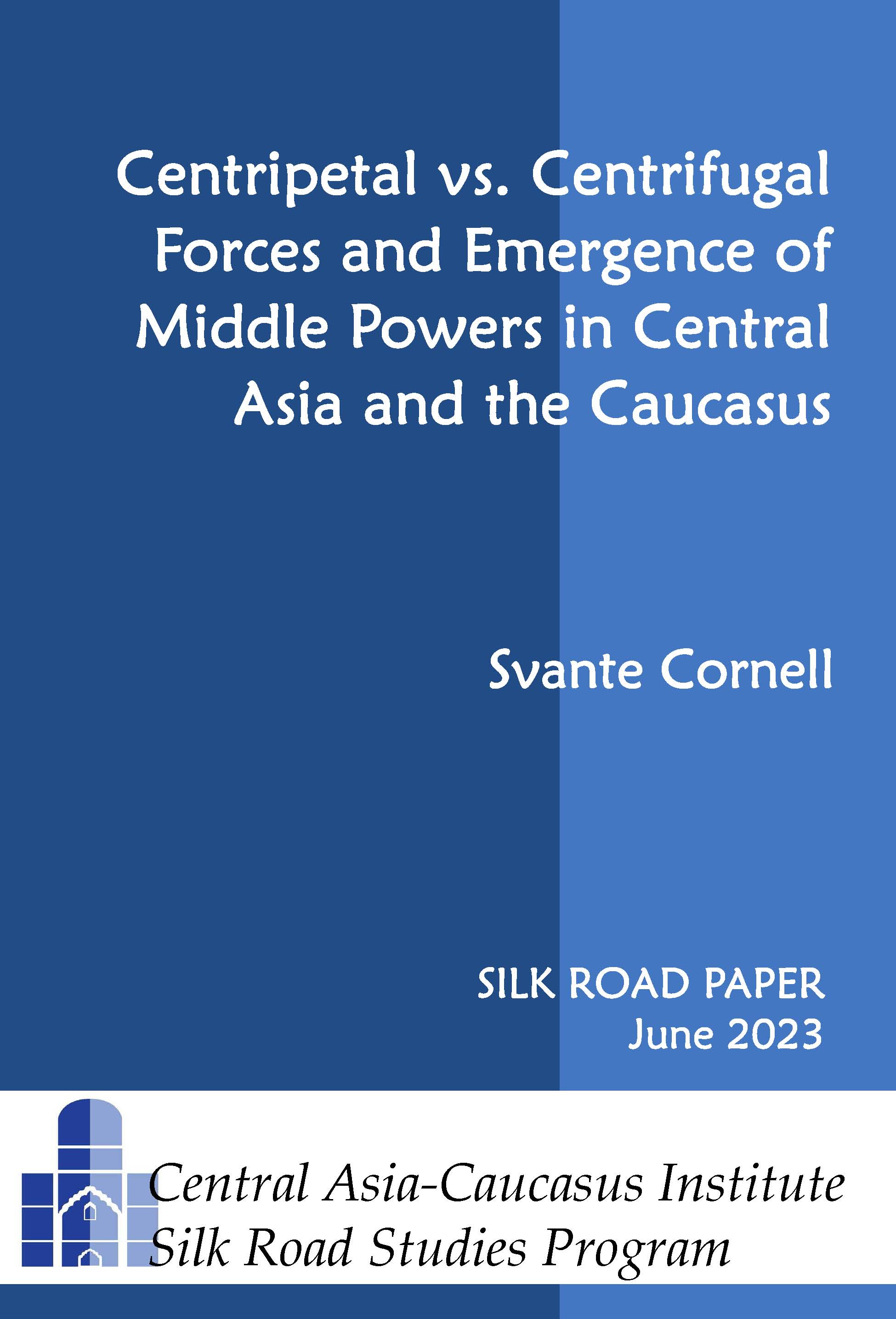The New Secularism in the Muslim World: Religion and the State in Central Asia and Azerbaijan

Centripetal vs Centrifugal Forces and Emergence of Middle Powers in Central Asia and the Caucasus
By Svante E. Cornell
Central Asia-Caucasus Institute & Silk Road Studies Program
Silk Road Paper
June 2023
Executive Summary
 The Russian invasion of Ukraine has drawn renewed attention to the geopolitics of Central Asia and the Caucasus. These are countries that have all faced a variety of assertive or aggressive Russian measures designed to undermine their sovereignty. Their responses have varied, however, both among states and over time. This raises the question of centripetal and centrifugal forces in Central Asia and the Caucasus.
The Russian invasion of Ukraine has drawn renewed attention to the geopolitics of Central Asia and the Caucasus. These are countries that have all faced a variety of assertive or aggressive Russian measures designed to undermine their sovereignty. Their responses have varied, however, both among states and over time. This raises the question of centripetal and centrifugal forces in Central Asia and the Caucasus.
Over the past three decades, internal and external forces seeking to strengthen the sovereignty and resilience of these states have clashed with forces seeking to undermine them. This has led to a growing divergence between stronger and weaker states, as centrifugal forces have come out on top in some countries while centripetal ones have dominated in others. To wit: several states have succeeded in building the institutions of independent statehood, have embarked on efforts to reform sclerotic institutions, have gained a meaningful ability to resist the entreaties of Russia and other regional powers, and are drivers of genuine regional cooperation. Others, by contrast, have seen their statehood compromised, and find themselves in a position where they are frequently unable to resist external pressure. Some lie somewhere in between.
The development of resilience in the region is linked to the social and economic changes taking place across Central Asia and the Caucasus. Countries that were locked into the Soviet system have now opened to the influences of the world, for better and for worse. As a result, a clear divergence has emerged between the Soviet and post-Soviet generations, with the latter considerably more independent of Russian-centric information sources and thinking, and considerably less passive with regards to social and political matters.
While this social development has been largely common across the region, economic development has been vastly divergent. The region has split into oil importers and oil exporters – with the region challenging academic notions of a “resource curse.” Indeed, oil exporters have proven much more resilient against centrifugal forces than oil importers.
This is visible not least in the varying ways through which political and economic change have taken place in the region. In the mid-2000s, “color revolutions” overtook mainly the region’s weaker semi-authoritarian states, generating much hope among well-wishers of democracy in the West. But over time, it became clear that revolutionary change did not succeed in producing sustainable democratic development – either in this region or in the Middle East and North Africa following the 2011 Arab upheavals. Indeed, no country that experienced these upheavals has progressed in a sustainable way toward democracy. Even those that seemed to do so, like Georgia and Tunisia, have visibly backtracked.
By contrast, from 2015 onward another trend has emerged, whereby the leadership in stronger regional countries – Azerbaijan, Kazakhstan and Uzbekistan – have concluded that they can no longer engage in business as usual, and must answer the popular demand for change while seeking to maintain stability. As a result, they have engaged in processes of gradual political, economic and social reforms. None of these reform programs are intended primarily to liberalize the political system or transform these countries into democracies. But they contribute to shifting the logic of the state-society relations from the Soviet model, where the state dominated society, to a modern one where the state’s task is to provide services to society. In so doing, they play a significant role in strengthening the resilience of the political and economic systems.
Meanwhile, these three states have also taken a lead in the development of mechanisms of regional cooperation. In the South Caucasus, the Armenia-Azerbaijan conflict made regional cooperation impossible, and led instead to the formation of trilateral Azerbaijan-Georgia-Turkey cooperation. This began with the major oil and gas pipeline projects connecting the three states, but branched out into a formalized trilateral cooperation format with periodic meetings at the foreign minister and defense minister level, which now includes cooperation in defense industrial development and joint military exercises.
In Central Asia, efforts at regional cooperation in the late 1990s were unsuccessful, being smothered by Russian-led processes of Eurasian integration. Following the shift of power in Uzbekistan that brought Shavkat Mirziyoyev to the presidency, however, a new wind of regional cooperation has swept Central Asia. This was made possible by a greater sense of confidence in countries’ sovereignty and statehood, as well as a greater sense of political and economic urgency resulting from geopolitical competition. Simply put, regional cooperation had become a necessity to avoid great powers dividing and ruling among Central Asian states.
Five years into this new period of cooperation, Central Asian leaders are meeting more frequently than ever, and coordinating policy on various issues in a novel way. They have sought to institutionalize this cooperation, based on international examples like ASEAN and the Nordic Council. Very clearly, Kazakhstan and Uzbekistan have led this process, even going so far as to conclude a treaty on allied relations – a clear signal to outside powers that Central Asians will not be divided by them.
Finally, particularly since the geopolitical situation deteriorated following the U.S. withdrawal from Afghanistan and Russia’s assault on Ukraine, Trans-Caspian cooperation has bloomed. This began even earlier with Azerbaijan and Turkmenistan overcoming long-lasting disagreements on the development of Caspian oilfields. More recently, there has been a major expansion in Azerbaijan-Kazakhstan and Azerbaijan-Uzbekistan ties, complementing the intensification of Kazakhstan-Uzbekistan relations.
Thus, two groups of countries have crystalized in Central Asia and the Caucasus. In one group, centrifugal tendencies remain dominant, making countries weak and vulnerable to a combination of internal and external upheavals. In another, the emerging middle powers, centripetal tendencies have come to dominate, as states have developed an ability to secure their sovereignty and act to preserve it. Importantly the emerging middle powers have paid close attention to cooperation with their weaker neighbors, while also serving as a model for them.
Over the past decade, this disparity has grown clearer. Azerbaijan, Kazakhstan and Uzbekistan have all established themselves as middle powers in part through their internal development, seeking to balance the demand for change from their societies with the imperative of maintaining stability in dangerous times. Their actions on the regional scene have indicated their growing agency: by cooperating with one another and establishing relations with an assortment of foreign powers, they are strengthening their external sovereignty while also helping some of their weaker neighbors avoiding falling into dependence on great powers.
This is not to say that the weaker states totally lack resilience or that there are no vulnerabilities in the stronger ones. As evidenced by Kazakhstan’s January 2022 crisis or the unrest in Uzbekistan’s Karakalpakstan region that summer, all regional states face challenges. Still, the difference is that the emerging middle powers have taken coherent and sustained action to address the deficiencies in the provision of public services, and their leaders have spoken honestly and forcefully about the problems plaguing their government and bureaucracy. They have announced many reforms, but the hard work lies in the implementation of these initiatives, a work that is decidedly one in progress. And going forward, the risk that anti-reform forces will succeed in slowing down implementation is considerable.
The emergence of middle powers is of crucial importance for the region’s future, and for the approaches taken by foreign forces that wish the region well. In short, it means that the notion of this region as a playground of great powers is no longer valid. As the middle powers have sought to devise strategies to prevent the domination of one or another regional power over them, they have also reached out beyond the confines of the region for partners. Seeking to engage East Asian, Middle Eastern and Western powers, the middle powers of Central Asia and the Caucasus are by default partners to the West, sharing a common interest of maintaining what amounts to geopolitical pluralism in the region.
Spring 2023 CAMCA Fellow Presentation: Ripples from Russia's War in Ukraine in the CAMCA Region
Join the spring 2023 Rumsfeld Foundation's Central Asia, Mongolia, the Caucasus and Afghanistan (CAMCA) fellows for a presentation on the regional economic and political implications of Russia's war in Ukraine. Speakers will examine various strategies to better protect their sovereignty, independence and territorial integrity and improve conditions for further economic development. Register for this in-person event to discuss these issues and learn why the U.S. should support the CAMCA countries in this challenging international environment.
Moderator: S. Frederick Starr, Chairman, Central Asia-Caucasus Institute at theAmerican Foreign Policy Council
When: Tuesday April 25, 2023 - 3:00-4:30 PM EST
Where: American Foreign Policy Council, 509 C Street, NE, Washington, DC 20002
CACI Webinar: The Growing Role of the S. Caucasus in European Energy Security
CACI Webinar: The Growing Role of the S. Caucasus in European Energy Security
Join our experts for a webinar discussing growing energy collaboration between the South Caucasus and Europe. They will provide a status update on growing supply of natural gas from Azerbaijan to several EU member countries, as well as on the prospect for energy transit from Central Asia and the potential for green energy supply by submarine power line under the Black Sea connecting Azerbaijan, Georgia, Romania and Hungary.
Panelists:
- Prof. Brenda Shaffer, U.S. Naval Postgraduate School
- Dr. Mamuka Tsereteli, Senior Fellow for Eurasia, Central Asia-Caucasus Institute at the American Foreign Policy Council
Moderator:
Dr. Svante Cornell, Director, Central Asia-Caucasus Institute at the American Foreign Policy Council
WHEN: Monday, March 6, 2023, 10:00-11:00 AM EST
Black Sea Cables to Slake Europe’s Thirst for Energy
By Mamuka Tsereteli
January 31, 2023
https://cepa.org/article/black-sea-cables-to-slake-europes-thirst-for-energy/
The world’s longest and deepest undersea power and digital cable line is to be laid between the eastern and western shores of the Black Sea.
The commitment was made by the leaders of Azerbaijan, Georgia, Romania, and Hungary in Bucharest on December 17. The deal foresees the transmission of green energy from the South Caucasus to Europe, and forms part of the European Union’s (EU) wider plans for energy diversification; It was praised byCommission President Ursula von der Leyen as a project “full of possibilities.”
Azerbaijan, a key producer of oil and natural gas, already plays a significant role in European energy security through recently agreed deals with the EU. In addition, both Azerbaijan and Georgia are important energy transit countries for Turkey, and Southern and South-eastern Europe. Key economic projects with geopolitical significance, like the Baku-Tbilisi-Ceyhan (running from Azerbaijan to Turkey) and Baku-Supsa oil pipelines, and the Southern Gas Corridor (again running east-west through Turkey) have elevated the importance of Azerbaijan as a major energy security player for Europe.
The EU’s decision to support the undersea power line between Georgia and Romania represents a significant development. It will allow electricity produced in Azerbaijan, Georgia, and other countries to be delivered directly to the European market. It will also help clean energy-producing countries to attract more foreign direct investment in hydro, wind, and solar power generation.
While Azerbaijan’s Caspian Sea wind farms may be the leading source of electricity for the power line, a preliminary economic analysis has demonstrated that the participation of the other South Caucasus countries will be important for its ultimate commercial success.
With the Russian invasion of Ukraine and the loss of Russian energy supplies, the EU’s need to diversify its energy sources, including both fossil fuels and renewables, is greater than ever. Naturally, this makes Azerbaijan increasingly important as a partner. The July 2022 visit to Baku of von der Leyen, and the subsequent signing of an energy agreement between the EU and Azerbaijan on increased natural gas supplies to Europe via the Southern Gas Corridor, have significantly elevated bilateral ties. That, in turn, has paved the way for a growing understanding of mutual dependence, as well as expanded collaboration on economic projects.
While Russia is having enormous problems, it is also adapting and preparing for a protracted conflict. Despite multiple shortcomings, ranging from a lack of discipline and cumbersome logistics to sluggish command and control (C2) and inadequate intelligence, surveillance, and reconnaissance (ISR), Russian forces have stabilized a vast front, entrenched themselves, and increased the attrition for Ukrainian units, especially in the Donbas.
This growing closeness serves as the backdrop for the most recent breakthrough by Georgia, Azerbaijan’s regional neighbor. The idea of the submarine power line between Georgia and Romania was born during the country’s partnership discussions with the EU back in 2018. The initial concept was based on Georgia’s interest in boosting its economic integration with the bloc, as well as the potential to export hydro energy to Europe. This led Georgia to request a pre-feasibility study from the World Bank, which was completed in 2020 (and is now publicly available.) The project, in turn, received a new boost with Azerbaijan’s interest in developing its vast wind power generation potential in the Caspian.
Georgia is now moving forward to the feasibility study stage, funded by the World Bank, which should confirm the project’s commercial viability, optimal transmission capacity, and exact routing. It will also examine some of the technical challenges, including the difficult geography of the Black Sea, as well as the need to cross two undersea natural gas pipelines connecting Russia and Turkey. In addition, the feasibility study will assess a need for additional power infrastructure at the Georgian and Romanian ends in order to ensure the stable operation of their power grids.
Initial costs estimates are around €2.5bn ($2.7bn), with one potential source of funding the EU’s funding European Economic and Investment Plan. Other finance may come from the European Bank for Reconstruction and Development (EBRD), the US International Development Finance Corporation (DFC), and others. Given the involvement of Romania and Hungary, both members of the Three Sea Initiative (3SI), it would be natural to have the 3SI Fund involved as well.
There have been several past projects to transmit energy from the eastern to western shores of the Black Sea, but they have foundered because of an array of political, economic, and technical problems. These include the White Stream natural gas pipeline project to ship Turkmen gas to Europe via Azerbaijan and Georgia, as well as the Azerbaijan-Georgia-Romania liquefied natural gas (LNG) interconnector project.
Yet this time there is a discernible political will to get the infrastructure built. The severance of Russian supplies was a serious shock for Europe and the urgent need to meet climate change objectives with greener energy are both providing significant momentum. The undersea power cable project has a realistic chance for implementation. That would blaze a trail for other projects to help boost connectivity in the Black Sea.
Mamuka Tsereteli, Ph.D. is Senior Fellow for Eurasia, American Foreign Policy Council/Central-Asia Caucasus Institute.


